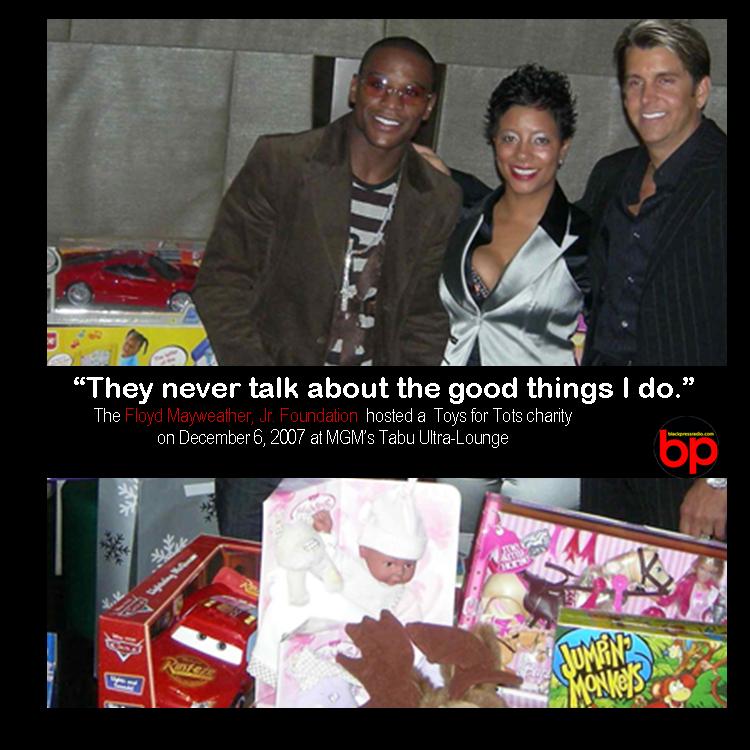Exclusive: Undisputed: Boxing legend Floyd Mayweather KNOCKS OUT Ricky Hatton 
New: Exclusive: Hear the Floyd Mayweather Podcast Series only on BlackPressRadio.com
Bare Knuckles: Boxing, Blacks and Beyond (Pt. 1)
(BlackPressMagazine.com) – When welterweight champion Floyd G. Mayweather, Jr. (l) entered the ring during December 8's historic fight, he had more than his fans behind him.
Mayweather's epic fight against undefeated British champion was as much about race as it was about history.
"I've always wanted to fight in the UK," Mayweather confessed. "When I wasn't able to fight in the UK we brought the best of the UK here to fight me. That's Ricky Hatton," said Mayweather, who hosted a Toys 4 Tots drive in Las Vegas on December 6.
The Mayweather/Hatton bout was so intensely debated that it split White Americans down the middle, many of whom were cheering for the British fighter to walk away with the world title. A video posted on the Black Press Channel of YouTube was evidence of the intense racial tension surrounding the fight.
"Come on Ricky the whole of England and half of the USA R behind you son," wrote ASW1988.
But not all Whites were cheering for Hatton.
"I'm British and I'd rather Mayweather wins [because] all the f*%$king hype around Hatton pisses me off," wrote viewer "Moshlord."
Some wonder why fighting a British fighter was so important to Mayweather.
It could have something to do with the not so pleasant racial history of the sport.
Boxing was created by the Greeks in the 18th century before becoming popular in England. The British brought boxing to America when the early colonies were established. Black slaves were forced to compete against each other for their slavemaster's enjoyment.
Jack Broughton, a British fighter developed the rules in 1743. Bill Richmond who was born in New York in 1763 became the first African American boxing champion. Richmond, who was a servant to a British lord and general, won his title in England.
Then there's Tom Molineaux, a respected and feared fighter who was a former slave from Virginia. He arrived in Britain standing five foot nine inches tall, weighing about 200 pounds and began fighting in 1810. It is said that some 25,000 people witnessed Molineaux beat Tom Cribb in a rematch in 1811. In 1838, the London Prize Ring Rules revised the rules that were developed by Broughton which prohibited the boxers from kicking, gouging or biting. The Queensbury Rules was slow to catch on and a bareknuckled championship was won by boxer John L. Sullivan in 1889 in America. The fight caused such controvesy that a color ban was insituted and Sullivan refused to fight Black boxer Peter Jackson who won the Austrialian heavyweight championship in 1886. Jackson later died at age 40 from TB.
 In the 1920s, some states legalized boxing and the Gloden Gloves gave many young Black boxers a ticket out of poverty. Some of them included Joe Louis, who was born in Alabama but later moved to Detroit, MI. He fought Max Schmeling in 1936 - about the time that Hitler's gentification message was being distributed. Louis lost to Schmeling but later avenged himself in 1938. He held the title for the next 25 fights and grossed over $4 million. Unfortunately, he later succumbed to bankruptcy after being dogged by tax debts.
In the 1920s, some states legalized boxing and the Gloden Gloves gave many young Black boxers a ticket out of poverty. Some of them included Joe Louis, who was born in Alabama but later moved to Detroit, MI. He fought Max Schmeling in 1936 - about the time that Hitler's gentification message was being distributed. Louis lost to Schmeling but later avenged himself in 1938. He held the title for the next 25 fights and grossed over $4 million. Unfortunately, he later succumbed to bankruptcy after being dogged by tax debts.
From 1935-1939, John Henry Lewis, the great-great grandson of Molineaux held the heavyweight title. In 1949, International Boxing Club (IBC) was founded and gave birth to lightweight champion Joe Brown who defended his belt 11 times from 1956-1961. Walker "Sugar Ray Robinson" Smith, Jr. won the Golden Gloves in 1939 and had about 200 fights in his 25 year career as a welterweight.
In 1964, Charles "Sonny" Liston fell hard to a young boxer named Cassius Marcellus Clay, Jr., who later converted to Islam and took the name Muhammad Ali. At the height of race relations, Ali was suspended from boxing after he refused to fight in the war. But the Supreme Court later reversed the decision. Ali fell to Joe Fraizer in 1971 but regained his title later that year against George Foreman. Ali lost the title to Leon Spinks in 1978 but regained it that same year to become the heavyweight champion. Larry Holmes owned the 1980s but lost to Sugar Ray Leonard under the World Boxing Council (WBC) in 1979. Leonard lost to Roberto Duran.
So as Mayweather clasp his right glove over his heart, looked to the heaven and gave praise immediately following December 8's knock out of British boxer Ricky Hatton, it was evident that he understood the victory that he scored for himself. But mostly importantly, it was clear that Floyd Mayweather, Jr. understood the magnitude of his historic victory for African descendents everywhere.
To hear our exclusive interview with Floyd Mayweather and rapper H-Flo, search keyword: Mayweather in the quicksearch. To hear the exclusive interview with Floyd Mayweather, visit http://www.youtube.com/blackpress
But, did New York find true love and will she finally put to rest the crazy rumors that she's pregnant with her new man, Tailor Made and is living with him and his young daughter since the show stopped taping. baby?
How will Buddha get over his loss of New York and will Sister Patterson finally come forward with the maternity of New York?
More likely than not, the answer will be revealed in what will surely be an I Love New York 3. But, until then we'll all sit through the upcoming I Love New York 2 Reunion next month where Tiffany "New York" will talk about how she chose her new guy, acts as if she's in love, and eventually break up with her new boo. Thus, we'll be in for I Love New York 3.
If you're as confused as the rest of us, you'll need some helping figuring this out so go to BlackPressRadio.com and listen to the exclusive, never heard interview with Man Man and then stay tuned for our exclusive interview with Solomon Wise and other cast members tomorrow!
To hear the podcast interviews cast members from "I Love New York 2" and "I Love New York" visit http://www.blackpressradio.com.
Be the first to know: Stay tuned to Black Press Magazine for updates on Wise's career including the release of his new single, My Girl. Become a member of the Historical Black Press Foundation or subscribe to our blog to be the first to know what's going on in Black media.
Related: Mr Boston: "New York" should have picked me; spin-off show in works
Fans cry fowl as BET's host Rosci poses for KING magazine
Vivicia Fox, Boris Kodjoe star in new stage play, "Whatever She Wants"
Michael Lewellen: Why I left BET interview and podcast
Pod-A-Palooza podcast conference will teach minorities the art of podcasting
Thousands of Black Writers involved in copyright class action lawsuit
Black Press All Star Awards set for September 15, 2007 in Washington, DC
Victoria Rowell Victoria Rowell Victoria Rowell Victoria Rowell Victoria Rowell Victoria Rowell Victoria Rowell Victoria Rowell Victoria Rowell Victoria Rowell Victoria Rowell Victoria Rowell Victoria Rowell Victoria Rowell Victoria Rowell Victoria Rowell Victoria Rowell Victoria Rowell Victoria Rowell Victoria Rowell Victoria Rowell Victoria Rowell Victoria Rowell Victoria Rowell Victoria Rowell Victoria Rowell Victoria Rowell Victoria Rowell Victoria Rowell Victoria Rowell Victoria Rowell Victoria Rowell Victoria Rowell Victoria Rowell
